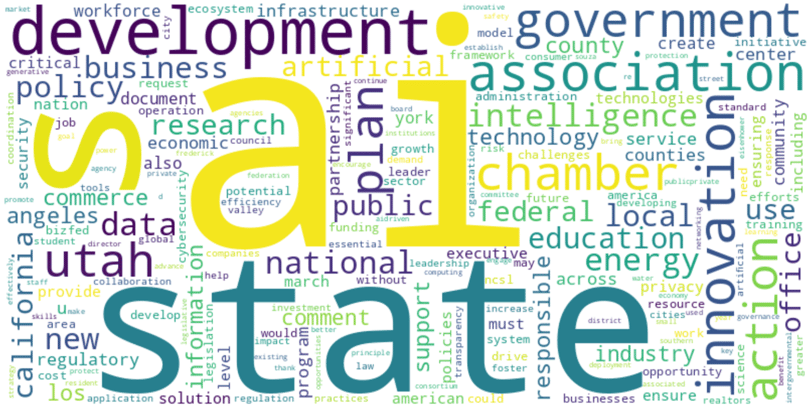Federal AI Action Plan RFI - AI Analysis of State and Local Government Responses
A deeper dive with a more detailed analysis for this category of respondents, complete with a sentiment analysis, word cloud, list of topics common across many responses, recurring themes among recommendations to the government, and any notable observations.
ARTIFICIAL INTELLIGENCE
4/27/20252 min read


State and local government organization responses to the federal AI Action Plan RFI reveal strong optimism and a forward-looking approach to AI’s potential. Respondents are focused on harnessing AI to promote regional economic growth, modernize government services, and strengthen education and workforce development. A sense of urgency and practical orientation runs throughout, with repeated calls for collaborative planning, actionable policies, and equitable access to AI’s benefits for all communities.
While highlighting the importance of innovation and action, state and local governments emphasize the need for clear guidance on data policy, responsible deployment, and ethical considerations. The responses reflect local and regional priorities and stress the importance of cross-sector and intergovernmental coordination to maximize AI’s positive impact.
The sentiment analysis for this group of respondents was highly positive, expressing viewpoints that were generally constructive and forward-looking. Most of the responses (70%) were generally positive/proactive, a smaller set (25%) was neutral/analytical, and few of the responses (5%) expressed concern or criticism, with those concerns being generally focused on risks or gaps in readiness.
Several themes recurred among recommendations across this group of responses:
AI for Economic Development: Repeated calls for leveraging AI to promote regional economic growth and business innovation.
Public Sector Modernization: Emphasis on using AI for more efficient, transparent, and responsive state/local government services.
Education & Workforce: Recommendations to strengthen AI-related education, digital literacy, and workforce retraining.
Equity & Access: Notable mentions of ensuring that AI benefits are accessible to all communities, not just urban or well-funded ones.
Collaboration: Frequent suggestions for federal-state-local collaboration and coordination (across sectors and levels of government).
Data Governance: Requests for clear national data policy and guidance, particularly around data sharing, privacy, and interoperability.
Responsible AI: Themes of AI safety, ethical deployment, public trust, and risk management (but less emphasis than positive opportunity themes).
Sector-Specific Opportunities: Some local priorities—AI for energy, public health, education, and county-level infrastructure.
A few interesting observations emerged from this group of responses. State and local governments expressed a striking sense of urgency relative to other groups—respondents want to move from planning to implementation and words like "action" and "plan" were among the most frequently used words. The responses displayed a minimal focus on negative consequences, instead reflecting a solutions-oriented mindset along with a strong sense of “let’s act together.” Lastly, whereas most of the respondent groups provided broad-brush perspectives, the feedback from state and local governments also highlighted regional or local priorities that were unique to the respondent community, and not necessarily of national relevance.
Unique Entity ID: RF8CGEK78DY4
© 2025. All rights reserved.


Navigation
#CambioMeansChange
CAGE Code: 9XEK8

